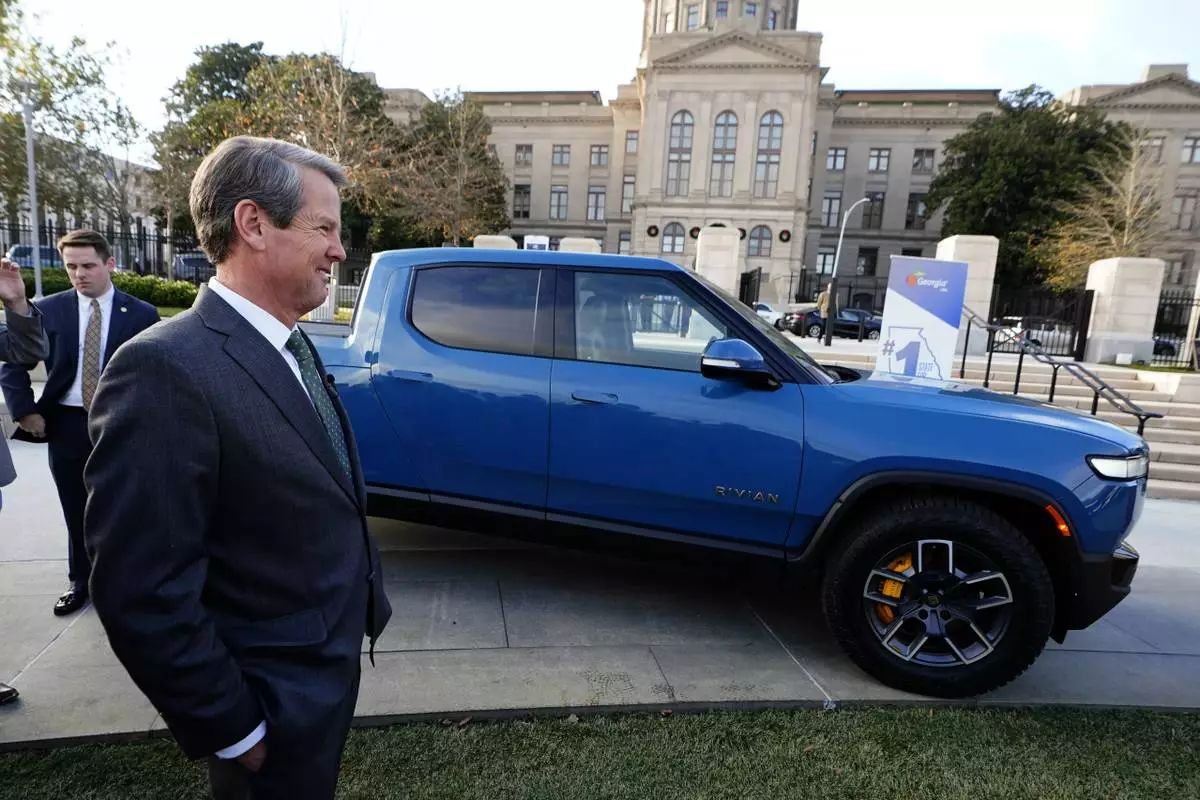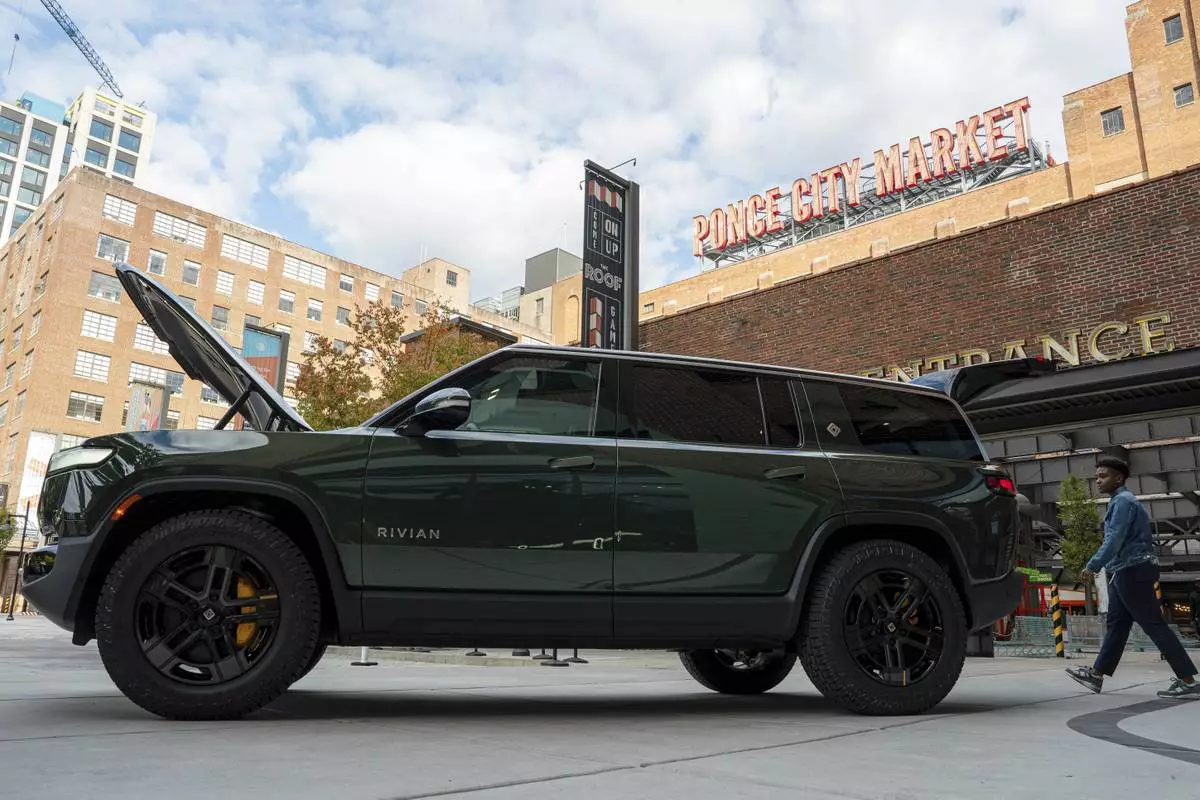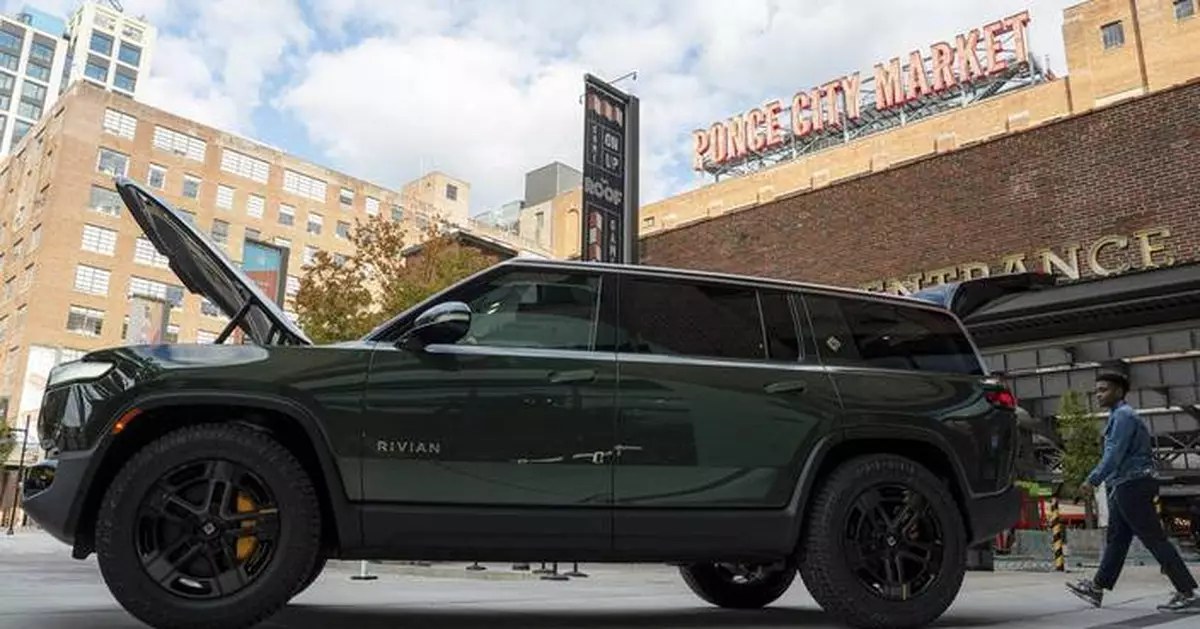ATLANTA (AP) — President Joe Biden's administration announced Tuesday that the U.S. Department of Energy will make a $6.6 billion loan to Rivian Automotive to build a factory in Georgia that had stalled as the startup electric vehicle maker struggled to become profitable.
It's unclear whether the administration can complete the loan before Donald Trump becomes president again in less than two months, or whether the Trump administration might try to claw the money back.
Trump previously vowed to end federal electric vehicle tax credits, which are worth up to $7,500 for new zero-emission vehicles and $4,000 for used ones.
Rivian made a splash when it went public and began producing large electric R1 SUVs, pickup trucks and delivery vans at a former Mitsubishi factory in Normal, Illinois, in 2021. Months later, the California-based company announced it would build a second, larger, $5 billion plant about 40 miles (64 kilometers) east of Atlanta, near the town of Social Circle.
The R1 vehicles cost $70,000 or more. The company plans to produce R2 vehicles, a smaller SUV, in Georgia with lower price tags aimed at a mass market. The first phase of Rivian’s Georgia factory is projected to make 200,000 vehicles a year, with a second phase capable of another 200,000 a year. Eventually, the plant is projected to employ 7,500 workers.
But Rivian was unable to meet production and sales targets and rapidly burned through cash. In March, the company said it would pause construction of the Georgia plant. The company said it would begin assembling its R2 SUV in Illinois instead.
CEO RJ Scaringe said the move would allow Rivian to start selling the R2 sooner and save $2.25 billion in capital spending. Since then, German automaker Volkswagen AG said in June it would invest $5 billion in Rivian in a joint venture in which Rivian would share software and electrical technology with Volkswagen. The money eased Rivian's cash crunch.
Tuesday's announcement throws a lifeline to Rivian's grander plans. The company said its plans to make the R2 and the smaller R3 in Georgia are back on and that production will begin in 2028.
“This loan would enable Rivian to more aggressively scale our U.S. manufacturing footprint for our competitively priced R2 and R3 vehicles that emphasize both capability and affordability,” Scaringe said in a statement.
The Department of Energy said the loan would substantially boost electric vehicles made in the United States and support the Biden administration’s goal of having zero-emission vehicles make up half of all new U.S. sales by 2030.
“As one of a few American EV startups with light duty vehicles already on the road, Rivian’s Georgia facility will allow the company to reach production volumes that make its products more cost competitive and accelerate access to international markets,” the department said in a statement.
The loan includes $6 billion, plus $600 million in interest that will be rolled into the principal. The money would come from the Advanced Technology Vehicles Manufacturing Loan Program, which provides low-interest loans to make fuel-efficient vehicles and components. The program has focused mostly on loans to new battery factories for electric vehicles under Biden but earlier helped finance initial production of the Tesla Model S and Nissan Leaf, two pioneering electric vehicles.
The program, created in 2007, requires a "reasonable prospect of repayment" of the loan.
Democratic U.S. Sen. Jon Ossoff, who has been a vocal supporter of electric vehicle and solar manufacturing in Georgia, hailed Tuesday's announcement as “yet another historic federal investment in Georgia electric vehicle manufacturing.” Ossoff had asked Energy Secretary Jennifer Granholm to support the loan in July.
“Our federal manufacturing incentives are driving economic development across the state of Georgia,” Ossoff said in a statement.
Georgia Gov. Brian Kemp says his goal is to make Georgia a center of the electric vehicle industry. But the Republican has had a strained relationship with the Biden administration over its industrial policy, even as some studies have found Georgia has netted more electric vehicle investment than any other state.
Kemp has long claimed that manufacturers were picking Georgia before Biden's signature climate law, the Inflation Reduction Act, was passed.
Efforts to bring Rivian to Georgia predated the Biden administration and "our shared vision to bring opportunity to Georgia will remain no matter who resides in the White House or what party controls Congress,” Kemp spokesperson Garrison Douglas said Tuesday.
The loan to Rivian could rescue one of the Kemp administration's signature economic development projects even as Biden leaves office. That could put Rivian and Kemp in the position of defending the loan if Trump tries to quash it.
State and local governments offered Rivian an incentive package worth an estimated $1.5 billion in 2022. Neighbors opposed to development of the Georgia site mounted legal challenges.
State and local governments spent around $125 million to buy and prepare the nearly 2,000-acre (810-hectare) site. The state also has completed most of $50 million in roadwork that it pledged.
The pause at Rivian contrasts with rapid construction at Hyundai Motor Group’s $7.6 billion electric vehicle and battery complex near Savannah. The Korean automaker said in October that it has begun production in Ellabell, where it plans to eventually employ 8,500.

FILE - Gov. Brian Kemp smiles as he stands next to a Rivian electric truck during a ceremony to announce that the electric truck maker plans to build a $5 billion battery and assembly plant east of Atlanta projected to employ 7,500 workers, Dec. 16, 2021, in Atlanta. (AP Photo/John Bazemore, File)

FILE - A locked gate on a closed road near the site of a planned Rivian electric truck plant is shown March 7, 2024, in Rutledge, Ga. (AP Photo/John Bazemore, File)

FILE - A truck leaves the site of a planned Rivian electric truck plant March 7, 2024, in Rutledge, Ga. (AP Photo/John Bazemore, File)

FILE - A Rivian R1S is displayed outside of the auto manufacturer's new space at Ponce City Market on Oct. 19, 2023, in Atlanta. (Matthew Pearson/WABE via AP, File)
NASHVILLE, Tenn. (AP) — Married couples across the U.S. have had access to no-fault divorce for more than 50 years, an option many call crucial to supporting domestic abuse victims and key to preventing already crowded family courts from drowning in complicated divorce proceedings.
But some advocates for women worried as old comments from now Vice President-elect JD Vance circulated during the presidential campaign opposing no-fault divorce. And after President-elect Donald Trump and Vance won the election, warnings began popping up on social media urging women who might be considering divorce to “pull the trigger” while they still could. Some attorneys posted saying they were seeing a spike in calls from women seeking divorce consultations.
Trump — who is twice-divorced — hasn’t championed overhauling the country’s divorce laws, but in 2021 Vance lamented that divorce is too easily accessible, as have conservative podcasters and others.
“We’ve run this experiment in real time and what we have is a lot of very, very real family dysfunction that’s making our kids unhappy,” Vance said during a speech at a Christian high school in California, where he criticized people being able to “shift spouses like they change their underwear.”
Despite concerns, even those who want to make divorces harder to get say they don’t expect big, swift changes. There is not a national coordinated effort underway. And states determine their own divorce laws, so national leaders can’t change policy.
“Even in some of the so-called red states, it hasn’t gotten anywhere,” said Beverly Willett, co-chair of the Coalition for Divorce Reform, whose group has unsuccessfully attempted to convince states to repeal their no-fault divorce laws.
Mark A. Smith, a political science professor at the University of Washington, said that while many Americans have become accustomed to no-fault divorce being an option, Vance’s previous comments on making it more difficult to separate from a spouse could help jumpstart that effort.
“Even though he’s not directly proposing a policy, it’s a topic that hasn’t gotten a ton of discussion in the last 15 years,” Smith said. “And so to have a national profile politician talk that way is noteworthy.”
Meanwhile, Republican Party platforms in Texas and Nebraska were amended in 2022 to call for the removal of no-fault divorce. Louisiana's Republican Party considered something similar earlier this year but ultimately declined to do so.
A handful of proposals have been introduced in conservative-led statehouses over the years, but all immediately stalled after they were filed.
In January, Oklahoma Republican Sen. Dusty Deevers introduced legislation that would have removed married couples from filing for divorce on the grounds of incompatibility. Deevers backed the bill after writing a piece declaring no-fault divorce was an “abolition of marital obligation.”
Similarly, in South Carolina, two Republican lawmakers in 2023 filed a bill that would have required both spouses to file for a no-fault divorce application rather than just one. And in South Dakota, a Republican lawmaker has attempted to remove irreconcilable difference as grounds for divorce since 2020.
None of the sponsors of these bills responded to interview requests from The Associated Press. All are members of their state’s conservative Freedom Caucus.
Nevertheless, some Democratic lawmakers say they remain worried about the future of no-fault divorce. They point to the U.S. Supreme Court overturning the constitutional right to abortion in 2022 as an example of a long-accepted option that was revoked through a decades-long effort.
“When you choose to be silent, you allow for this to creep in,” said Democratic South Dakota Rep. Linda Duba. “These are the bills that gain a foothold because you choose to be silent.”
Before California became the first state to adopt a no-fault divorce option in 1969, married couples had to prove their spouse had violated one of the approved “faults” outlined in their state’s divorce law or risk a judge denying their divorce, said Joanna Grossman, a law professor at Southern Methodist University in Dallas. Qualified reasons varied from state to state, but largely included infidelity, incarceration or abandonment.
The system was a particular burden on domestic violence victims, often times women, who could be stuck in dangerous marriages while they try to prove their partner’s abuse in court through expensive and lengthy legal proceedings.
“If there was any evidence that the couple both wanted to get divorced that was supposed to be denied because divorce was not something you got because you wanted it, it was something you got because you’ve been wronged in a way that the state thought was significant,” Grossman said.
To date, every state in the U.S. has adopted a no-fault divorce option. However, 33 states still have a list of approved “faults” to file as grounds for divorce — ranging from adultery to felony conviction. In 17 states, married people only have the option of choosing no-fault divorce to end their marriages.
Calls to reform no-fault divorce have remained fairly silent until the late 1990s, when concern pushed by former President George Bush’s administration over the country’s divorce rate sparked a brief movement for states to adopt “covenant marriages.” The option didn’t replace a state’s no-fault divorce law, but provided an option for couples that carried counseling requirements and strict exceptions for divorce.
Louisiana was the first state to embrace covenant marriage options, but the effort largely stopped after Arizona and Arkansas followed suit.
Christian F. Nunes, president of the National Organization for Women, said she is “extremely worried” about the possibility of no-fault divorce being removed with the incoming Trump administration, Republican-controlled Congress and wide range of conservative state leaders.
“With so many states focusing on a misogynistic legislative agenda, this will turn back the clocks on women’s rights even more,” Nunes said in a statement. “This is why removing ‘no fault’ divorce is another way for the government to control women, their bodies, and their lives. Eliminating no-fault divorce is also a backdoor way of eliminating gay marriage, since this implies that a marriage is only between a man and a woman.”
With Trump’s reelection, Willett, whose group opposes no-fault divorce, said she’s cautiously optimistic that the political tide could change.
“Was what he said an indication of things to come? I don’t know,” Willett said. “It’s a good thing but it’s certainly not anything that has been really discussed other than a few high profile conservatives who talk about it.”

FILE - A couple exchanges wedding bands at City Hall in Philadelphia, Oct. 11, 2018. (AP Photo/Matt Rourke, File)














